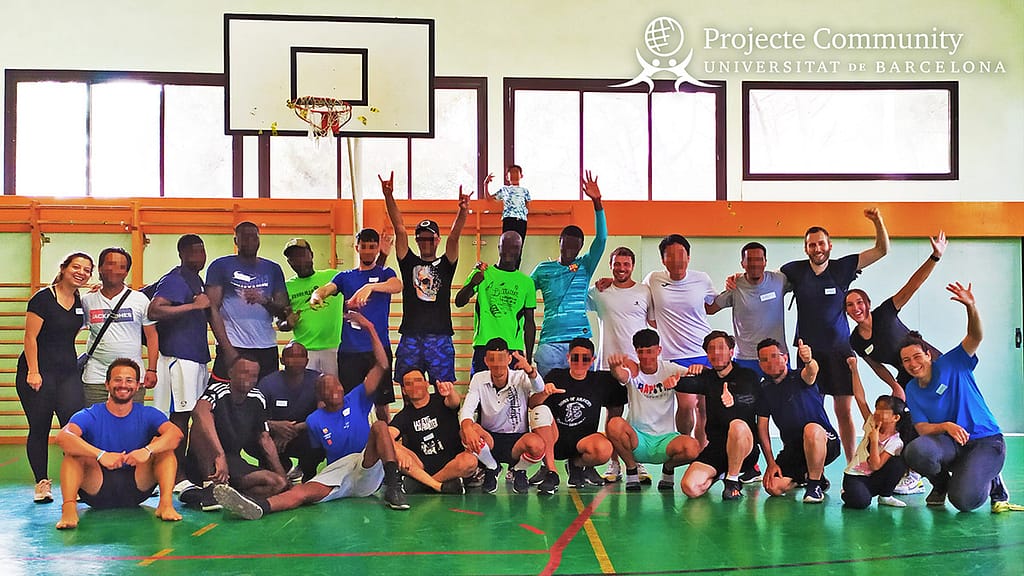- The Socio-Sports Meeting was organised by the ‘COMMUNITY’ project of the University of Barcelona’s Faculty of Education to promote coexistence and social cohesion in Barcelona.
- Refugees and asylum seekers from the Barcelona Red Cross and Alcantara Family Foundation from Bolivia, Guinea, Morocco, Benin, Mali and Ivory Coast participated in the event.
- Professionals from the Spanish Commission for Refugee Assistance (CEAR) and the Alcantara Family Foundation attended to experience the benefits of the Socio-Sports Meetings and assess their replication within their organisations.

Barcelona, 14 June 2023.
To commemorate 20 June, World Refugee Day, the ‘COMMUNITY’ project of the University of Barcelona (UB) organised a Socio-Sports Meeting in which almost 30 refugees, volunteers and professionals working on refugee issues enjoyed exercising together to create community and improve coexistence in the city.
One of the objectives of this event was to create a common space where refugees, citizens and actors working on refugee issues would experience the potential of sports activity as a tool to respond to some of refugee-related social problems.
Sport as a tool of socialisation and inclusion
Participants from countries as different as Bolivia, Guinea, Morocco, Benin, Mali, Ivory Coast, Poland, Argentina, Venezuela and Spain had fun together and experienced the unifying power of physical activity. “When playing”, explained Laura Tomàs, the facilitator of the activity, “all people are equal and the barriers created by different cultures, languages, ages, genders or nationalities disappear”.
According to Laura, this is one of the reasons why the Socio-Sports Meetings use cooperative motor-skill games as a way to promote socialisation between people from different cultures, as is the case of refugees and their host community. Developed by the Faculty of Education since 1993, this methodology helps to reduce segregation and social exclusion while facilitating the participants’ physical and psychological well-being and helping them to develop their social skills.

“I had a nice time. I had fun and forgot about my problems”, said David, one of the participants, during the evaluation of the Meeting. “Also, by facing group challenges, we worked together with each other as a team despite the language barrier”.
Transfer Socio-Sports Meetings to third-sector organisations
Organised at the University of Barcelona’s Mundet Campus, the event was also attended by professionals from third-sector organisations like the Alcantara Family Foundation and the Spanish Commission for Refugee Aid (CEAR), which experienced the Socio-Sports Meetings to assess whether they could be replicated in their organisations.
“Society must change how regards refugees and provide solutions and initiatives to include them on an equal basis”, said Mateusz Kendzierski, a psychologist at CEAR. “Therefore, I think the Socio-Sports Meetings are a very interesting approach because the participants relate naturally as equals. They also provide an alternative to standard sports that are not suitable in all cases, providing a non-competitive, versatile and inclusive response for all different types of people”.
For the last 30 years, the Socio-Sports Meetings have been replicated in other universities in Latin America, Europe, Catalonia and elsewhere in Spain. With its ‘COMMUNITY’ project, the UB wants to take a step forward and transfer them to the core of the organisations that work directly with refugees and asylum seekers to promote their social inclusion.

Practical responses to the need for social cohesion
On World Refugee Day, ‘COMMUNITY’ wants to focus on the need to establish mechanisms in society that provide practical and effective responses to problems of cohesion in an increasingly multicultural and global population moving towards a more inclusive and egalitarian society.
Through the Socio-Sports Meetings that it organises weekly, it aims to help to create this society, working to achieve the objectives of the University of Barcelona in promoting the culture of peace, freedom and pluralism and in transmitting the civic and social values of a democratic and plural society.
The ‘COMMUNITY’ project is funded by the European Commission and is implemented by the UB Faculty of Education in collaboration with Fundació Solidaritat UB, working in networks with refugee organisations like the Red Cross, Acathi, Refugees Welcome, Accem, CEAR, Alcantara Family Foundation, Superacció and others.








